Avoidants do some weird things when they like you.
I know this because for years, I was a dismissive avoidant, so I’m in a unique position to speak on this.
Look at this, these are my doors of weirdness.
Behind each one of these doors is, you guessed it, a weird behavior exhibited by avoidants.
Let’s just jump right in and open up door number one with “pre-emptive breakup planning.”
Door #1: “Pre-emptive Breakup Planning”
Alright, time to embarrass myself. I have done this.
No, not just done this, I am the king of doing this.
It’s November 19th 2010, Harry Potter and the Deathly Hallows has just released in theaters. I know because I was on double with a girl named Cassie, my best friend, and his girlfriend.
Now, Cassie liked me.
I knew she liked me, she knew she liked me, everyone knew she liked me.
But I’m not thinking about Cassie, I’m thinking about how to protect myself. How to ensure that I can keep a distance and maintain my independence, my single status.
Now honestly, Cassie did nothing wrong.
She was pretty, polite and quite frankly, was a catch I didn’t deserve.
You see, my plan to maintain my distance from her started the moment I picked her up for the date.
She says, “Wow, you look great Chris. I’m so excited to see the movie.” To which I say, “Hey, me too… but just to let you know this is just a friend date. I don’t want you to get any ideas.”
Ya… I literally started the date out that way.
But that’s not the weird part. Here’s the weird part.
I kept repeating this line throughout the entire night.

What Are Your Chances of Getting Your Ex Boyfriend Back?
Take the quizAlways a new variation.
- “We’re just going to be friends.”
- “This is the most fun I’ve had with a friend.”
- “I’m so happy this isn’t like a real date.”
Little by little, each time I muttered something to that effect, I saw as her happiness faded away.
What I was doing was simple. I was setting the stage to ensure that nothing serious developed and if it did develop I had an easy out to break things off.
In other words, it was a pre-emptive breakup plan.
But here’s the twist.
I was doing it before any relationship had even begun.
Think of this like a psychological safety net. It ensured I had an escape route if things got too intense.
Now, my approach was always to ensure “we were just friends”
But other dismissive avoidants have come up with countless ways to lay the groundwork for a breakup.
Let me know if any of these ring a bell,
Trick #1: Establishing a “No Strings Attached” Mindset:
So, like I said, this was my “go to.”
Basically the dismissive avoidant insists on keeping things casual, emphasizing that they don’t want anything serious. Even if the connection deepens, they’ll maintain this stance as a way of keeping the breakup option open.
Trick #2: Creating Emotional Distance Early On:
Right from the beginning and might subtly create emotional barriers, such as avoiding deep conversations or keeping you at arm’s length. This distance is a way of preparing themselves (and you) for an eventual separation, even if things are going well.
Trick #3: Sometimes They’ll Drop Hints of Future Disconnection:
They might make offhand comments like, “I’m not good at relationships,” or “I don’t think this will last,” even before anything has really started.
Once again, this is something I did to Cassie on our date.
Trick #4: Creating Scenarios That Could Lead to Conflict:
They might unconsciously (or even consciously) create situations that could lead to misunderstandings or arguments, almost as if they’re testing how things might fall apart. This pre-emptive sabotage is a way to control the potential breakup narrative.

What Are Your Chances of Getting Your Ex Boyfriend Back?
Take the quizTrick #5: Referencing Past Failures:
They might frequently bring up past relationships that didn’t work out, almost as a warning sign. It’s their way of setting expectations low, so if things do go south, it won’t be a surprise. This can feel weirdly self-defeating, as they’re already preparing for the end before the beginning has even fully unfolded.
Now, why is this behavior considered “weird.”
Well, it’s because it’s the exact opposite of what most people do when they start liking someone.
Instead of building a foundation for a strong relationship, they’re laying the groundwork for its eventual demise.
Think of it like constructing an exit door before the house is even built. For the person on the receiving end, this can feel confusing and unsettling since the relationship is tinged with an odd sense of doom from the start.
Ah, but that’s not even close to the weirdest thing I’ve seen avoidants do.
Door #2: “Micro-Gifting”
I had to dig deep for this one, but as always, good ole Reddit came through.
I stumbled across this reddit post in the avoidant attachment subreddit entitled, Reluctance at receiving gifts
And the person who wrote this talks in depth about how avoidants receive gifts.
Check this out,
“In my experience, avoidants will often react to gift giving by humoring you, but then they will either:
- Avoid using it.
- “Accidentally” break, ruin or lose it
- Secretly give it away
- Buy the exact same thing for themselves and use that instead.
Pretty wild, right?
But it’s actually this next part that got me.
“If an avoidant gives a gift, they often downplay it by claiming that they found it or got it for free and ask if you want it, or try to hide their vulnerability in some other way.”
In other words, they are Micro-Gifting.
Alright, so what is “Micro-Gifting.”
Well, this is going to be a little embarrassing but years ago I actually was invited onto Fox News to talk about “Micro-Cheating.”

What Are Your Chances of Getting Your Ex Boyfriend Back?
Take the quiz- Micro-Cheating is all about small breaches of trust in a relationship that don’t pass the threshold into a physical affair.
Hence the name “Micro.”
Micro-Gifting is kind of like that.
- It’s where they give you extremely small or obscure gifts that don’t make sense at first glance. These gifts are often symbolic or as the reddit person pointed out, the avoidant will downplay it in some way.
Look at this.
These are three examples of “micro gifts” that I’ve seen avoidants give to their “significant others.”
First we have:
The “Found Object” Gift
An avoidant might give you something small they claim to have “found” or stumbled upon by chance, like a unique rock, a coin, or a small trinket. They’ll downplay it by saying, “I found this and thought you might like it,” rather than framing it as a meaningful gift.
Next up we have,
The Practical Yet Impersonal Gift
They might give you something practical, like a new pen, a notebook, or a keychain, with the explanation that they “had an extra” or “didn’t need it.” It’s something useful, but the way they present it makes it seem almost like an afterthought, even though it might be something they picked out specifically for you.
Next we have,
The “I Got It for Free” Gift
An avoidant might give you a gift and immediately downplay its value by saying they got it for free, like a promotional item from work or a sample product. They’ll say something like, “I got this for free, do you want it?”
Let’s pause here briefly.
I actually have some experience with this one.
I grew up in Texas and one of the big things we have every year in Houston is the Houston Livestock Show and Rodeo.
In college I had managed to score some tickets to this thing and I actually invited a girl I liked to attend with me.
What did I say to convince her?
“Oh, I got these for free.”
Why did I frame it that way?
I was doing everything in my power to ensure that I couldn’t get rejected. So, I lessened the impact of the gift on purpose as a way of protecting myself. My fragile ego couldn’t handle getting rejected by this person.
And I think there’s a lesson in that.
For avoidants, this need to protect themselves manifests in behaviors like “Micro-Gifting,” where they minimize the importance of their gestures to avoid exposing their true feelings. While this approach might feel safer, it can also prevent genuine connection, as the other person may never fully realize the significance behind the gesture.
In the end, protecting ourselves too much can actually hinder the relationships we’re trying to build.
But let’s move on.
Door #3: The Avoidant Love Language:
Let’s play a game.
Before you, you see the five love languages.
- Quality Time
- Words of Affirmation
- Physical Touch
- Receiving Gifts
- Acts of Service
If you knew nothing but a simple definition of an avoidant, what would you guess their love languages are?
Well, most people would probably choose, Acts of Service
Why?
Well, actual Acts of Service are practical and can be done without requiring deep emotional engagement or verbal expression.
And since we know avoidants often avoid verbal affirmations and emotional closeness, people might assume they show love through actions that help or support their partner in practical ways, like fixing something, running errands, or doing chores.
You ready for the weird part? This is wrong.
Check this out.
I picked up this little tidbit from a popular website run by therapists called, Relationship Matters Therapy.
In an article about attachment styles and love languages the following is said,
“Avoidant-dismissive attachment may cherish more quality time or physical touch as their love languages because these seem to require the least amount of verbal expression but still establishes affection and appreciation.”
But to further add credence to this I actually dug deeper.
I ended up on this reddit thread entitled, “Ask Avoidants FAQ Receiving Love, Care And Support“
Basically someone wanted to ask avoidants a bunch of questions about how they receive love, care and support.
It’s the first question they ask on this thread that applies to our discussion. “How can someone show they support/love/care for you? When have you felt most loved or supported?”
In total, only 11 avoidants answered. Which isn’t a lot.
But out of those eleven, 4 specifically mentioned quality time and physical touch as being their number one factor for how they hope other people show love and care for them.
Here’s what I find impressive about this. This was completely unprompted.
The question wasn’t, “Hey avoidants, what’s your love language.” It was, “How can someone show they care for you.”
Almost half of the avoidants, who answered, literally said quality time and physical touch.
Why is this? And why is this weird?
Well, avoidants often struggle with verbal expressions of love and affection, which makes their reliance on physical touch or quality time as their primary love languages somewhat contradictory.
I mean the truth is that these love languages are typically associated with closeness and connection, which avoidants generally shy away from.
Let’s move on though.
Door #4: We Have Avoidants Engaging in “Intellectual Sparring”
Let’s pull out page 115 of Attached for this one.
Rachel S.F. Heller and Amir Levine write, “Mike, who is 27, has spent the last five years with someone that he feels is not his intellectual equal. They love each other very much, but there’s always an underlying dissatisfaction in Mike’s mind about the relationship. He has a lingering feeling that something is missing and that someone is better around the corner.”
The part I want to key in on here actually has more to do with the first part of the sentence. The whole “intellectual equal.”
Alright, keep that in mind because we’re going to circle back around to it.
But basically, Instead of typical flirtation, avoidants might engage in intellectual sparring or debate with someone they like. This is a way to connect without being emotionally vulnerable, using their intellect as a barrier and a bridge simultaneously.
In addition to that, if we reference the little excerpt I read to you from “Attached” above, we can also infer that avoidants are doing this as a way to distance themselves before things get too serious.
By considering themselves “better” than their partner they literally set up an escape route out of the relationship.
After all, “something is missing, right” “Maybe they can do better? Maybe the grass is greener on the other side.”
Hmmm… where does that sound familiar?
Ohh… right, we talked about that behind Door #1 with the Pre-Emptive Breakup Planning.
So, what does this actually look like though?
Well, there are typically three instances where you’ll see this.
- Challenging Your Views: They might deliberately take a contrary position in discussions, not because they disagree, but because they want to engage with you on a deeper, intellectual level.
- Playful Debate: This could come across as playful teasing or intense debate, which to them is a way of bonding without exposing their emotional side.
- Respect Through Challenge: By challenging you, they’re subtly showing respect for your intelligence and valuing your opinion, even if it seems like they’re being argumentative or distant.
Alright, let’s move on to our next door.
Door #5: Creating “Emotional Distance with Purpose”
Avoidants often distance themselves emotionally. This shouldn’t come as a shock to anyone.
However, if they like you, they might engage in what I’d call “emotional distance with purpose.”
This involves deliberately putting up walls or creating distance, not just out of fear or discomfort, but as a way to test how safe the relationship is or to maintain control over their emotions.
Usually you see this happen over the course of four stages:
- Subtle Testing: They might create situations where they pull back emotionally to see if you’ll chase after them or respect their space. It’s a way of gauging whether you’re someone who can handle their need for independence while also caring for them.
- Silent Check-Ins: Despite pulling away, they might keep tabs on you in indirect ways—liking old social media posts, asking mutual friends about you, or even showing up at places they know you’ll be, without making direct contact.
- Creating Opportunities for You to Initiate: They might set up scenarios where you’re “invited” to make the first move, like sending a vague text that leaves room for interpretation, or mentioning a place they like without directly inviting you.
- “Reverse Support”: They might offer help or support in odd ways, like helping you with something practical or offering advice, but in a way that seems detached. It’s their way of connecting without exposing too much of their vulnerability.
This behavior isn’t typically discussed as it’s nuanced and doesn’t fit the typical avoidant narrative. It’s weird because it’s a blend of pushing you away while also pulling you closer, all done with an underlying hope that you’ll somehow decode their intentions.
And really that’s the difficult part about all this weird behavior.
Understanding an avoidant’s actions requires reading between the lines and recognizing that their emotional distance is often a complex dance of protection and connection.
I’m not defending them. For many people, the right choice is to turn tail and run from avoidants.
But I don’t think the right way of looking at them is as if they are less than human. They’re not monsters.
But sometimes their behavior can be hurtful.
While it may seem contradictory, these weird behaviors do reveal their deep desire to connect. It’s just that they don’t want to lose themselves in the process.
The challenge for people in relationships with these individuals lies in seeing past the walls that the avoidants build to the vulnerable person behind them. The vulnerable person who’s cautiously hoping you’ll understand them and stick around.






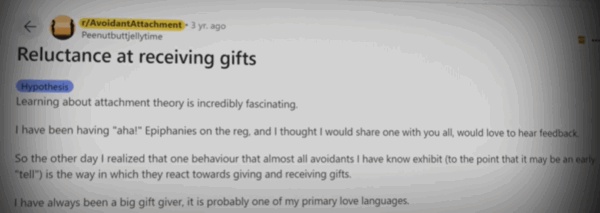

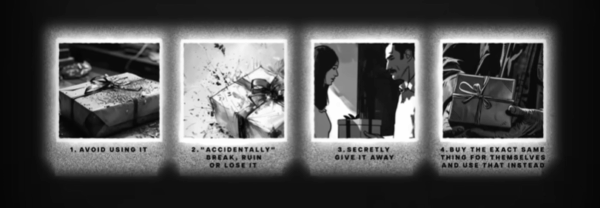





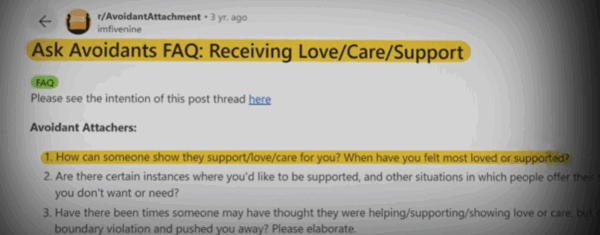


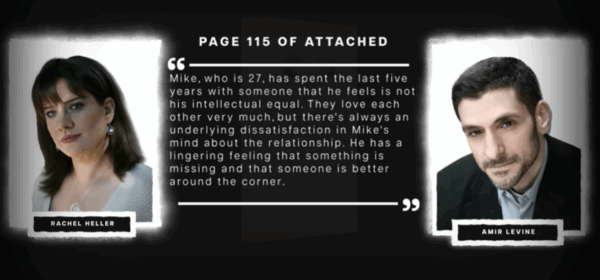

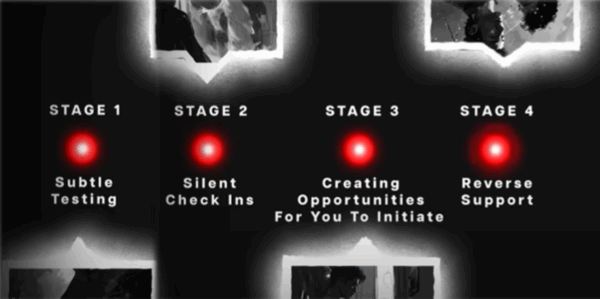

Silvie
June 25, 2025 at 12:22 pm
Dear Chris,
your words perfectly reflect my own experience with a DA.
I suppose, being a bit of one myself, it was reasonably easy for me to read between the lines and understand at every moment what he wanted and needed to feel safe.
Moreover, being aware of the immense effort he constantly put in, fighting against himself to keep the relationship alive, allowed me to truly appreciate (and be moved by) how much he felt for me. Now, I continue to feel very happy by his side, and he by mine.
But I think it’s important to know, beyond interpreting their signs of deep love, what you can expect and what you can’t in the relationship. Ours will never be a conventional relationship. But it’s the most authentic, mature, and beautiful one I’ve ever experienced in my life.